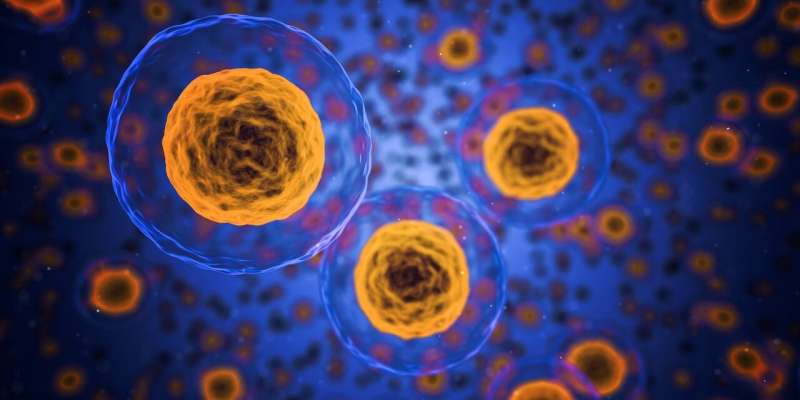Scientists discover possible genetic target for treating endometriosis

Michigan State University researchers have identified a potential genetic target for treating an especially painful and invasive form of endometriosis.
Their study published in Cell Reports, a scientific journal, could lead to better treatments for women suffering from severe forms of endometriosis, said Mike Wilson, a postdoctoral fellow in the MSU College of Human Medicine. Wilson and Jake Reske, a graduate student in the MSU Genetics and Genome Sciences Program, are first authors of the study.
Their research focused on a type of endometriosis that occurs in women who have a mutation in a gene called ARID1A, which is linked to the more invasive and painful form of the disease. When ARID1A is mutated, so-called "super-enhancers," a part of the DNA that determines the function of cells, run wild, Reske said. This allows the cells that normally line the uterus to form deep implants outside the uterus and cause severe pelvic pain.
"There haven't been many successful nonhormonal therapies for this form of endometriosis that have made it to the bedside yet," Reske said.
In laboratory experiments, he and Wilson tested a drug that appeared to target the super-enhancers and stop the spread of endometriosis. Such a drug—part of a new type of treatment called "epigenetic therapy" that controls how genes are expressed—could be far more effective than current treatments, including surgery, hormone therapy and pain management.
Endometriosis, particularly the kind associated with the ARID1A mutation, can be debilitating for many women, often leading to infertility.
"It can seriously impact women's quality of life and their ability to have a family and work," said Ronald Chandler, an assistant professor of obstetrics, gynecology and reproductive biology, who supervised the study. "It's not easy to treat, and it can become resistant to hormone therapy. The most clinically impactful thing we found is that targeting super-enhancers might be a new treatment for this deeply invasive form of the disease."
The drug they studied targeted a protein in cells called P300, suppressing the super-enhancers and offsetting the effects of the ARID1A mutation, Wilson said. The same type of treatment could be used to treat other forms on endometriosis, he said.
The researchers already are planning follow-up studies to find other drugs that could target P300, Wilson and Reske said.
The MSU team collaborated with Van Andel Institute researchers, providing them with tissue samples for VAI scientists to analyze with a machine called a next-generation sequencer.
More information: Mike R. Wilson et al. ARID1A Mutations Promote P300-Dependent Endometrial Invasion through Super-Enhancer Hyperacetylation, Cell Reports (2020). DOI: 10.1016/j.celrep.2020.108366

















